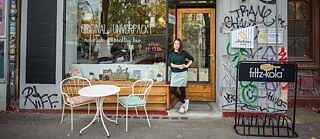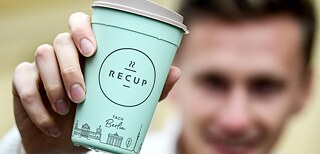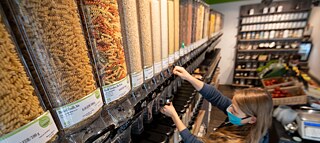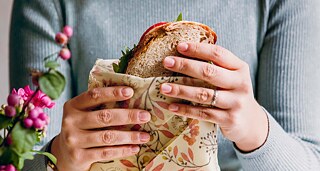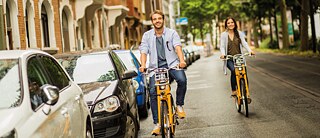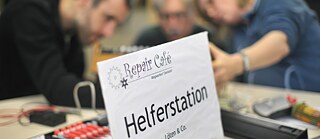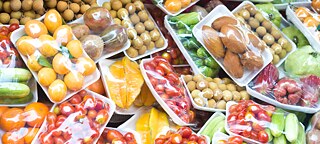Most people would like to lead a life that is in harmony with their environment - but it should be as comfortable as possible and without major restrictions. There are actually a few ideas on how to do this – small everyday aids that have a major impact on the environment.
By Petra Schönhöfer
Deposit systems – the green way to guzzle
RECUP | Photo (detail): © picture alliance/Britta Pedersen/dpa/dpa-Zentralbild
Every year around 2.8 billion disposable coffee-to-go cups are thrown away in Germany. That is 320,000 cups per hour. With all the lids, straws and stirring sticks that go with them, they let the mountain of rubbish grow by around 55,000 tons annually. This is where RECUP comes in, a Germany-wide deposit cup system. In many shops you can order coffee in a RECUP beaker instead of in a disposable cup, pay a deposit of one euro and then redeem the empty cup at any RECUP partner. The system works nationwide, from Munich in the south to the Baltic Sea in the north at over 2,400 locations. The pastel-coloured cups made of 100 percent recyclable plastic are also available as part of a Skyline Edition with a view of each participating city’s skyline on the outside – to collect!
No packaging – a hip revamp of corner shop culture
Tante Olga in Cologne | Photo (detail): © picture alliance/Marijan Murat/dpa
In the old days there used to be less packaging! In the good old corner shops, goods were wrapped in newspapers, there were barrels and glasses full of loose groceries. That was a necessity for corner shop owners, but today zero-waste stores in Germany are consciously trying to stem the flood of rubbish in the grocery trade. In addition to the pioneer Original Unverpackt in Berlin, there is, for example, Tante Olga in Cologne. Olga Witt’s shop has a contemporary range of fair, organic and vegan foods – and all of them with no packaging just as it was in grandma’s day. However, if you do shop in a zero-waste shop, you should bring your own containers for to put your loose goods in.
Online shopping – plastic-free
Buy plastic-free online | Photo (detail): © Little Bee Fresh
Is there still no zero-waste store in your city or do you live in the country? No problem! The mail order business is also going through a rethink and now there are more and more opportunities for plastic-free shopping on the Internet. The assortment ranges from groceries and everyday items to baby products and office supplies to kitchen utensils and home accessories. There are, for example, online shops like Greenhall in Thuringia or Laguna in Saxony. Monomeer, based in Constance, works primarily in the field of body care with a zero-waste concept and My little Steps in Cologne offers complete starter sets for leading a plastic-free life – for the bathroom or kitchen, for example.
Mobility – rent a bike now
Public bike rental in Germany | Photo (detail): © meinRad
When it comes to sustainable mobility in the city, one immediately thinks of the bicycle. In fact, there are now many smart solutions for public bike rental in Germany. One of them comes from Mainz and is called meinRad: download the app, search for the right bike station on the map and simply scan the QR code of the bike of your choice – and you’re ready to go. Rental and billing are automated and cashless, temporary parking is no problem thanks to the electronic key and what is particularly practical – the bike tariffs and the rental locations are in sync with local public transport. There are similar concepts in many other cities and even on the island of Usedom.
Upcycling – long live the coffee machine
Repair Café | Photo (detail): © picture alliance/Daniel Naupold/dpa
The best way to make life more sustainable is to use everyday objects over a longer period of time, but that also means – repairing them instead of throwing them away. But what can you do with a broken coffee machine if you cannot distinguish a circuit from a mandala? How do you sew a new zipper into a fluffy down coat without any tailoring skills? Quite simply – you don’t have to do these things yourself. Instead, you look for someone who is familiar with the task in hand and you meet them in the relaxed atmosphere of a Repair Café . There are now over 2,000 of these temporary repair workshops in Germany. You can find them at www.repaircafe.org
Replace plastic – report it!
Fruits in plastic | Photo (detail): © Adobe
We have all been annoyed when shopping about products that actually don’t need any packaging. Mother Nature has already packaged many things well, for example, an onion or an apple. A coconut shrink-wrapped in plastic? Not really useful. A frequently cited argument by manufacturers, however, is that the customers want it that way. That is why there is the Replace Plastic app by Jennifer Timrott and her Küste gegen Plastik (Coast Against Plastic) initiative. Simply download it and scan the bar-codes on unnecessary plastic packaging. The initiative then reports to retailers that we want more environmentally friendly packaging for these products.
CodeCheck – know what’s inside
CodeCheck | Photo (detail): © CodeCheck
Sustainable lifestyles have many faces – some people are completely vegan, others avoid certain ingredients such as palm oil. Still others are fed up with polluting their bodies with microplastics. The CodeCheck app is the perfect solution – scan the product barcode, receive information about the product’s ingredients based on scientific sources and get to know healthier, more sustainable alternatives. All of this can be personalised to your own needs. The community is so enthusiastic that CodeCheck temporarily even overtook WhatsApp and the like in all the usual app stores.
